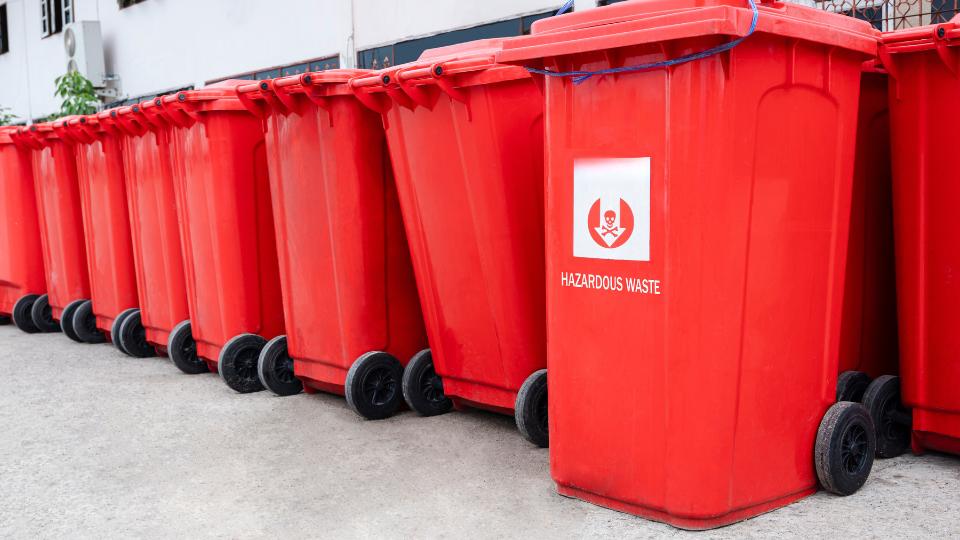Ensuring your business is compliant with UK waste disposal regulations can feel overwhelming. Nevertheless, with the right guidance, you’ll be able to manage it and even improve your bottom line.
Remember, proper business commercial waste management is essential for:
- Regulatory compliance
- Environmental responsibility
- Operational efficiency
This guide will help you deal with the complexities of UK waste laws. This includes the types of waste you need to handle and best practices to streamline your waste disposal process.
Why Proper Business Waste Disposal Matters in the UK?
Proper business waste disposal is critical to running a sustainable and compliant operation. For businesses in the UK, there are three key reasons why effective waste management matters:
- Environmental Responsibility
Managing your business waste helps reduce pollution and conserves resources. The UK’s strict environmental regulations encourage businesses to recycle, reduce landfill waste, and adopt sustainable practices that protect the environment. according to Junk Removal Fife.
- Regulatory Compliance
The UK’s Environmental Protection Act 1990 as well as the Waste Regulations 2011, impose strict responsibilities on businesses. Any UK business that fails to follow these regulations can face significant fines or even legal action. Your company must follow duty-of-care requirements, including using licensed waste carriers and maintaining proper waste records (Waste Transfer Notes).
- Reducing Costs and Improving Reputation
Proper waste management reduces your operational costs by minimizing the waste sent to landfills and maximizing your recycling efforts. Additionally, adopting environmentally responsible waste practices can boost your company’s reputation and meet growing consumer expectations for sustainability.
Understanding Different Types of Commercial Waste
There are different types of waste your business may produce. Each type has specific regulations and disposal methods:
- General Waste
This includes everyday waste such as paper, packaging, and non-hazardous materials that can’t be recycled.
- Hazardous Waste
Includes substances that are harmful to health or the environment, such as chemicals, asbestos, or contaminated materials. Hazardous waste requires special handling and disposal by licensed carriers.
- Recyclable Waste
This category includes materials like cardboard, plastics, metals, and glass. Recycling these items helps businesses meet sustainability goals and reduce costs.
- Special Waste
Electronic waste (WEEE), batteries, and fluorescent tubes fall under this category and need to be disposed of according to specific regulations.
Best Practices for Business Waste Management
Effectively managing your business waste requires a strategic approach that balances compliance, cost-efficiency, and sustainability. Here are some best practices to help streamline the process:
- Conduct a Waste Audit
In a waste audit, you assess the types and volumes of waste your business produces. This can also help you identify opportunities to reduce your waste, improve recycling, and save money.
- Reduce and Recycle Commercial Waste
The less waste you produce, the less you have to dispose of. Also, the more you can recycle, the less you spend on landfill costs.
Implement recycling policies in your business, such as providing clearly labeled recycling bins and purchasing recycled products. You should also partner with local recycling companies to handle your recyclable waste streams.
- Partner with Licensed Waste Carriers
It’s not about getting rid of waste; it’s about doing it legally. You’re responsible for ensuring that a licensed waste carrier properly handles your waste.
Verify if your waste carrier is registered with the UK’s Environment Agency. Use the public register to check their credentials, and always request proof of disposal for your records.
Legal Obligations for Businesses Handling Waste in the UK
UK businesses have several legal obligations when it comes to waste management. Key requirements include:
- Duty of Care
Your businesses must ensure waste is managed responsibly from production to disposal. This involves keeping waste secure, using licensed carriers, and ensuring the waste is disposed of legally.
- Waste Transfer Notes (WTNs)
Every time your waste is transferred to a third party, a WTN must be filled out. These notes provide a written record of the waste type, quantity, and how it’s being handled.
Maintain proper records of your WTNs for at least two years, as required by law. Use a checklist to ensure you’re fully compliant with your duty-of-care responsibilities.
Sustainable Waste Disposal Can Reduce Costs and Improve Efficiency
Sustainable waste management helps the environment and makes good business sense. Sustainable practices help you cut waste disposal costs and boost your company’s efficiency.
- Reduce Costs
Minimize waste sent to landfills to reduce your disposal fees. Also, maximize your recycling efforts to generate revenue from recycled materials.
- Improve Corporate Social Responsibility (CSR)
Your waste sustainability goals can enhance your brand’s reputation while satisfying consumer demand for responsible business conduct.
Choose the Right Commercial Waste Disposal Service
When selecting a provider, consider the following factors:
- Cost
Look for a service that offers competitive pricing while ensuring compliance with regulations.
- Service Coverage
Ensure the provider can handle the specific types of waste your business produces.
- Sustainability
Choose a provider that prioritizes recycling and sustainable practices.
Before signing a contract, ask about the company’s recycling rates, their licensing status, and any additional fees.
Avoid Common Pitfalls in Business Waste Management
Many businesses fall into common traps when managing their waste, leading to non-compliance, fines, or increased costs. Here’s how to avoid them:
- Non-compliance
Ensure you’re up to date with the latest regulations and maintain proper waste management records.
- Improper Classification of Waste
Misclassifying waste can result in improper disposal and legal penalties. Always segregate hazardous, general, and recyclable waste.
- Using Unlicensed Carriers
Always verify that your waste carrier is licensed. Using an unlicensed carrier puts you at risk of fines for illegal dumping.
Conclusion
Effective business waste disposal is essential for compliance, sustainability, and cost-saving. Know your legal obligations, manage your different types of waste, and implement best practices. This, in turn, can reduce your costs, improve operational efficiency, and minimize your environmental impact.
Now is the time to review your waste management practices. Consider partnering with a professional waste management company to ensure your business is compliant with UK regulations.


